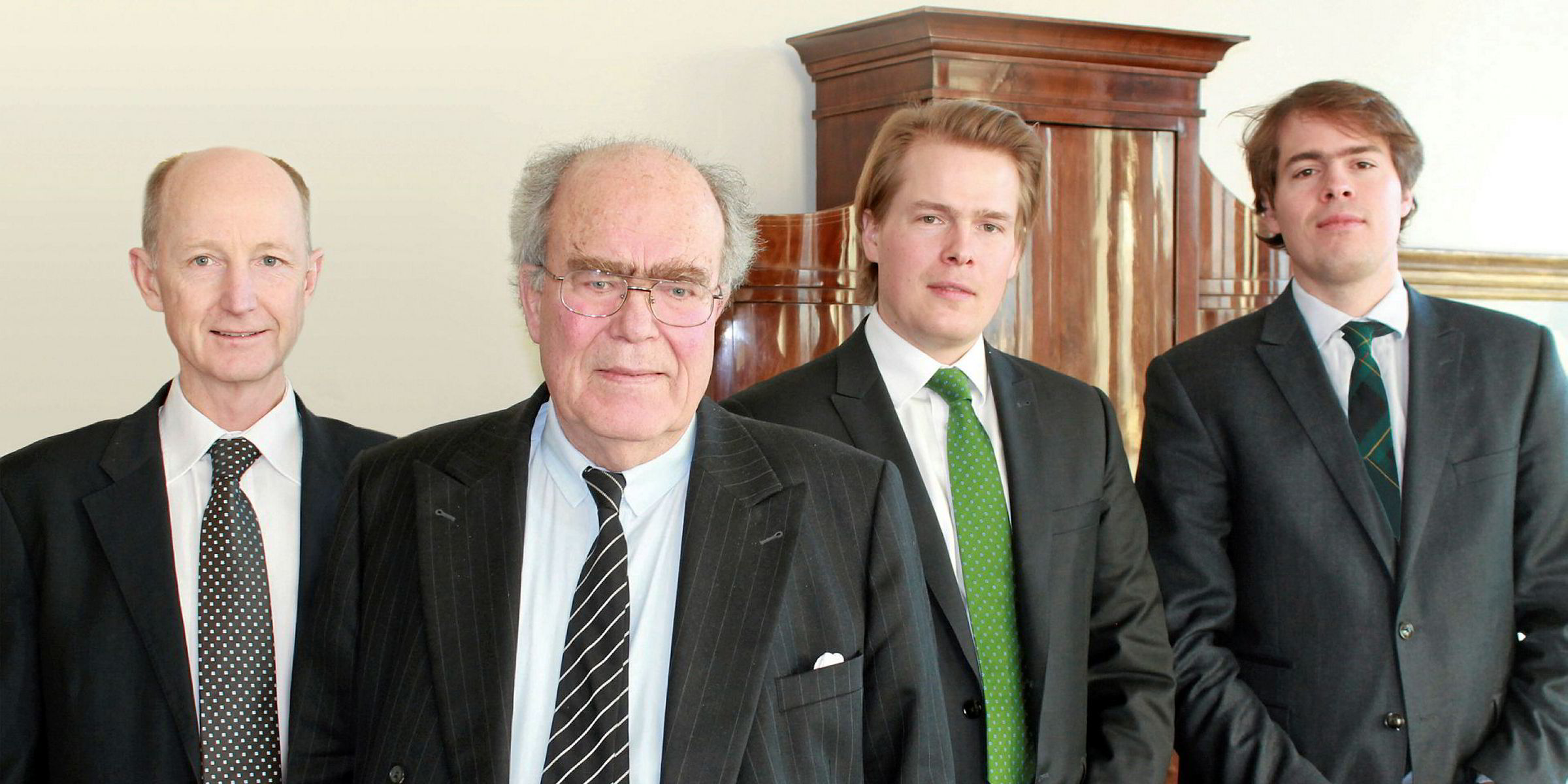Dr Heinrich Schulte is apologetic about not recollecting our last meeting. That’s okay: it was 25 years ago. His two sons, Christoph and Johann, were only seven and nine at the time, but even then he had talked about succession plans.
“I’ve managed to keep ahead of the times; only hope they can,” he said in the winter of 1992.
A quarter of a century later, and we have a lot of catching up to do, but the 82-year-old Schulte is momentarily lost for words when asked why he carries on. His reply comes in the form of a bemused glare that suggests stepping away from the shipping business was never going to be an option.
However, his two sons, now in their 30s, are firmly entrenched in managerial roles in the Schulte Group, even if their father remains chairman of the advisory board, “where all the important decisions are taken”, according to the corporate website.
Schulte is one of the towering figures of German shipping for the past half-century. Of the many lessons he has passed on to his boys over the years, there is one in particular he wants them to learn beyond any other: how to keep the 134-year-old business in family hands as the fifth generation takes over.
“Above all, we want to remain a family enterprise,” Dr Schulte stresses during our meeting at his offices in the heart of Hamburg’s harbour.
The past nine years have shown that is perhaps easier said than done. Many German family shipping names have been consigned to history as a result of the longest downturn in living memory.
The Schulte Group, which employs 17,000 seafarers, owns around 90 ships and manages close to 580, has weathered the economic storm comparatively well.
Schulte has seven children, including five daughters. But it is the two male heirs, Johann (34) and Christoph (32), who are shouldering the responsibility of taking the Hanseatic company forward.
Both were made partners in 2013 under the watchful eye and guidance of chief executive Ian Beveridge, a 26-year veteran of the Schulte Group.

Preparing the fifth generation has involved passing on the skills that have enabled Schulte to weather every shipping market since it was founded in 1883 in Papenburg, northwest Germany, by Konsul Johann Hermann Schulte and Christoph Bruns.
Foremost among these skills has been a degree of restraint.
“Shipping and shipowning is a segment where you have to make sure that you don’t overstretch your potential,” says Dr Schulte.
“That means you have to be careful with investments, make sure you are not overloaded with loans.
“You have to make sure that you nevertheless find partners who would enter into a joint venture with you without taking part in the shareholding.”
Johann and Christoph learned many of those lessons at their father’s knee. But they have also gained experience outside the family fold with shipping companies around the world.
Johann studied at university in London and Singapore and spent a couple of years in Chile working with companies of the Von Appen family. He undertook a stint in the container and bulk chartering desk that is a legacy of a relationship forged between Schulte and the late Klaus Oldendorff — a man admired by Heinrich as “tough and full of spirit”.
The chartering desk operates today as Hanseatic Unity Chartering in a partnership between Schulte, Reederei Nord and Borealis Maritime, while Johann has moved on to responsibility for new business at the Schulte Group.
Christoph studied in Scotland and earned a master’s degree at Shanghai Maritime University. He is developing the North Sea offshore wind division with long-term charters. “That’s a segment that we want to further grow,” he says.
Having shipping in their blood means the brothers have been around long enough to witness the “roller-coaster” movements of industry cycles, says Johann. “We did our apprenticeships in the ‘golden age’ of unbelievable charter rates paid. We saw that side of the market. So we know where it has been and where it is now.”
Schulte managed its exposure during the shipping crisis better than many, helped by a series of long-term charters. It has scaled down its exposure in the KG (limited partnership) sector to be left with a single aframax tanker out of what was a fleet of 32 KG-financed vessels.
But it has also needed to be dynamic. The withdrawal of German banks from shipping markets has prompted it to find funding elsewhere.
That led to tapping into Chinese finance, including a partnership for offshore wind vessels with Industrial and Commercial Bank of China Financial Leasing. Today, most of its credit comes from Chinese banks.
Another break with tradition came with the forging of a partnership with US private equity giant JP Morgan. The two jointly ordered 16 containerships ranging in size between 2,400 teu and 5,400 teu. The last four of the smaller ships are still to be delivered.
“It’s a lot of work to keep these co-investors satisfied. But it has been a very fruitful co-operation,” says Dr Schulte.
The heart of the group’s shipowning operation is the container and tanker sectors. It partly or fully owns 56 containerships from 700 teu to 9,400 teu, eight LPG vessels and 18 chemical tankers.
But the future focus is on profitable specialised areas of business.
“Niches,” says Dr Schulte. “That’s what we’re aiming for, because otherwise you can’t earn any money any more.”
That explains why recent orders have included 7,500-cbm LNG bunkering vessels as well as a 174,000-cbm LNG carrier, Comet Arrow, for delivery next year. LNG is a new segment that complements Schulte’s shipmanagement business. It will manage 10 such vessels by 2019.

Christoph argues that it has been important for the company to show a willingness to adapt the business model and to do new things. Without that philosophy, there would be no Bernhard Schulte Shipmanagement, which, after more than 40 years, ranks as the third-largest shipmanager in the world. Vessel management remains challenging, with many owners taking the business in-house, but Schulte has expanded its operation to provide services to banks.
“Shipmanagement is not an easy occupation today,” Dr Schulte admits. “Nevertheless, there are many institutional buyers that need the assistance of a shipmanager, so that compensates for the drain that is going on.”
The family tends to shy away from the public eye, and the patriarch has an acute awareness of the importance of its image. “What is most essential in our industry is you maintain a good reputation. If you lose that, particularly in shipmanagement, you’ve had it!” he says.
The family continues to branch out into new areas, with Christoph involved in the running of its newest operation, BS Offshore. It was formed in 2015 to operate wind farm maintenance vessels and recently took delivery of the 5,897-gt Windea Leibniz (built 2017), the second of two service operations vessels ordered from Norway’s Ulstein Shipyard.
And while Schulte has less of a shipowning presence in the dry sector, here too the younger generation is displaying a more opportunistic streak. Last year, the company moved into the market to acquire small secondhand bulkers.
It plans to buy more bulkers, although there are concerns that ordering of newbuildings might eventually take the shine off the market.
“I personally see the next two or three years as an opportunity to do an asset play here and there — before new investors get a hunger for yield and order bulk carriers,” says Johann.
While the future of the group looks to be in safe hands, its patriarch regards the crisis affecting Germany’s maritime sector as “a deplorable situation”.
He makes comparisons with his time as a trainee at St Mary Axe, home of the Baltic Exchange, in London in the 1950s and 1960s. Back then, the shipbuilding and shipping market was controlled by the British, but their dominance slipped away to other nations.
It remains to be seen whether Germany follows the same path. But few would bet against the sixth generation of the Schulte family being there to find out.




